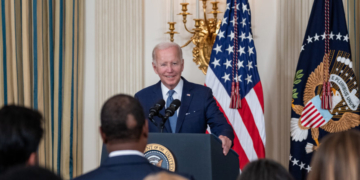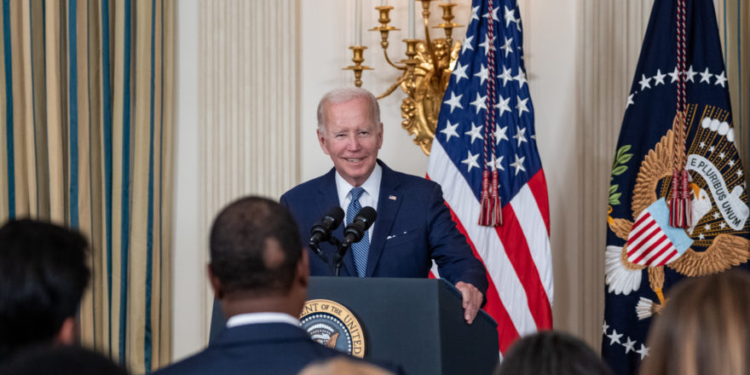The Chamber of Commerce and America’s leading oil and gas trade association are planning to defend some aspects of President Joe Biden’s signature climate bill from a potential repeal, according to Politico.
The Chamber and the American Petroleum Institute (API) both opposed the massive Inflation Reduction Act (IRA) before Biden signed it into law in 2022, and both organizations have criticized aspects of the administration’s sweeping climate agenda. However, the two groups are gearing up to protect certain parts of the bill from being repealed by former President Donald Trump should he win the presidency in November’s elections, according to Politico.
“While we support some of the elements designed to advance innovation and strengthen America’s energy security, we remain committed to repealing misguided provisions like the natural gas tax, which could lead to higher energy costs for consumers,” Dustin Meyer, API’s senior vice president for policy, economics and regulatory affairs, said in a statement shared with the Daily Caller News Foundation.
JANET YELLEN: “The Inflation Reduction Act is, at its core, about turning the climate crisis into an economic opportunity.”
Fantastic, what does the Inflation Reduction Act do to reduce inflation? pic.twitter.com/btsHoG3qd0
— Daily Caller (@DailyCaller) April 4, 2023
“We’ll work vigorously to ensure that the provisions that we support in the IRA sustain during a potential Trump administration,” Mike Sommers, president and CEO of API, previously told E&E News. “This has always been a bipartisan organization. The industry is bipartisan.”
The provisions that API may move to defend reportedly include tax credits for hydrogen fuel and carbon capture projects, according to Politico.
The Chamber also supports a piecemeal approach to any possible attempt to walk back Biden’s climate law.
“To be clear, the Chamber does not support the blanket continuation of all the policies included in the IRA,” Neil Bradley, executive vice president and chief policy officer at the organization, said in a statement shared with the DCNF. “Like tax policies enacted elsewhere, the Chamber will judge the individual policies enacted as part of the IRA based on the best available data and whether or not the provisions support greater economic growth and improve American competitiveness. This test will require careful evaluation by the business community and policymakers.”
“We remain concerned that many of the administration’s economic policies are attempts at micromanaging the economy that ultimately will result in less economic growth and lower wages for American families,” Bradley added.
Christopher Guith, the senior vice president for the Chamber’s Global Energy Institute, has also indicated that the organization may defend certain parts of the bill, telling Politico that “business is going to defend the Inflation Reduction Act.”
IRA subsidies and tax credits have already spurred a considerable amount of private investment that could be affected if underlying incentives are substantially altered or eliminated altogether, according to Politico.
“The reality of the world is various organizations like the American Petroleum Institute and the Chamber of Commerce exist to make money for their constituent members,” Mike McKenna, a GOP strategist with extensive experience in the energy sector, told the DCNF. “The tricky part about it is, of course, that other tax credits are going to open up, and other government actions are going to ultimately wind up doing more damage on net to API and the Chamber than they should.”
Both organizations are empowering an administration that is generally hostile to their interests by attempting to preserve some parts of the Biden agenda that they like, and both groups have also lost influence among Republicans in recent years, McKenna added.
Trump has been fiercely critical of the IRA and Biden’s $1 trillion-plus climate agenda while on the campaign trail. Trump and many other Republicans have been vague about whether they will launch a full-fledged repeal effort if they have the chance, or if they will look to scrap some facets of the IRA while preserving others, such as tax credits for carbon capture that some energy companies may want to keep, according to Politico.
Trump pledged during a May 1 speech in Wisconsin to “impose an immediate moratorium on all new spending, grants and giveaways” from Biden’s domestic agenda, including funds unleashed by the IRA.
The Trump campaign seems to be highly combative over the issue of electric vehicle (EV)-related subsidies in the IRA. Trump campaign national press secretary Karoline Leavitt described those incentives as “handouts” that will amount to “a death sentence to the American auto industry” in a statement shared with the DCNF.
The bill also has strong critics in the Senate who would like to repeal most or all of it. Republican Wyoming Sen. John Barrasso told the DCNF that “much of [the IRA] needs to be repealed,” and Republican Utah Sen. Mike Lee described the law as “a wasteful spending scheme that increased taxes” and said that “Republicans should repeal the Act in its entirety.”
Republican Texas Sen. Ted Cruz characterized the IRA as a “a farce from the beginning” and stated that he is “proud to lead the push to repeal it” in a statement shared with the DCNF.
“This is unfortunately entirely predictable. Corporations will always try to protect and preserve tax breaks that are favorable to their business ventures. It’s part of the eternal dynamics between the business world and government,” David Blackmon, a 40-year veteran of the oil and gas business who now works as a consultant and author focusing on energy, told the DCNF. “Corporate leaders tend to be more focused on short term results than on the long-term health of the industry they’re in, and associations like API and the Chamber have a duty to act on behalf of their members.”
All content created by the Daily Caller News Foundation, an independent and nonpartisan newswire service, is available without charge to any legitimate news publisher that can provide a large audience. All republished articles must include our logo, our reporter’s byline and their DCNF affiliation. For any questions about our guidelines or partnering with us, please contact [email protected].


























